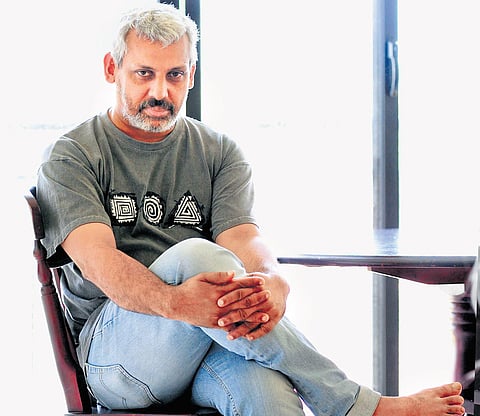

Kochi-based author Anees Salim’s published works never fail to create a buzz. His novel Vanity Bagh was the winner of The Hindu Literary Prize for Best Fiction in 2013, The Blind Lady’s Descendants won the Kendra Sahitya Akademi Award in 2018. He was also the winner of the Atta Galatta-Bangalore Literature Festival Book Prize for Best Fiction in 2017 for his novel The Small Town Sea. This advertising executive’s work has been translated into several Indian languages. With a hectic day job as the head of the creative department of Draft FCB Ulka, Kochi, he still continues to find time to release his books at regular intervals. His recent release The Odd Book of Baby Names is touted as one of his most ambitious novels so far. It offers its readers a kaleidoscopic journey into the dysfunctional heart of the Indian family and his tragicomedy style of writing is intact here too. Edited excerpts from an interview:
Tell us about the idea/inspiration behind your latest work of historical fiction The Odd Book of Baby Names.
The idea of this book came to me many decades ago. I was living in an old city that was once ruled by a king who was as eccentric as he was magnanimous. I made friends with a taxi driver who claimed to be the direct descendant of the ruler. He talked about the king with a lot of pride and a twinge of sadness, and called him Abbajan. He lived in a slum behind a railway station and kept saying that he should have been living in the palace near the taxi rank. I didn’t believe him. I still doubt the veracity of his claim. But a quick research revealed that the king was rumoured to have countless concubines and more than hundred children. That bit of information stayed with me and gradually grew into a novel.
What kind of research went into this book?
When I started gathering materials for this story, history books did not help much. So I depended on people who had vivid memories of the king and his ways. And they happily provided me with many stories about the king’s illegitimate children. Nobody was sure about the number of children the ruler fathered, but most of the people I interviewed agreed that the number could easily cross a 100.
Are the stories in the book real or inspired?
The setting is real, the names are fictitious, and the stories are inspired by people who claimed to have known many of the king’s illegitimate children. This book is a blend of fact and fiction. I think every work of fiction is.
Where do you draw inspiration for the nine distinctive voices in the book, each from a diverse background?
This book could not have been narrated in a single voice. So I attempted to write nine different stories with thin margins between them. After each draft the margins blurred a little and finally it became, at least to me, one seamless story.
Please elaborate on the theme of loss in this book.
This book is definitely about loss. The loss of power, loss of hope, loss of love, loss of memories and, above all, loss of bonding. Though all the characters in this book are siblings, they walk different paths, they lead different lives, many of them stay unknown to each other, and each is doomed to bear a sense of emptiness till the end. It is the sense of loss that is their common inheritance.
How do you combine the lightness of comedy with the seriousness of tragedy?
I think that comes naturally to me. Probably that is the only way I can write. I have a tendency to spot humour and sadness in the most unlikely places. For instance, I see hilarious moments in a house of death and I come across snippets of utter sadness in places buzzing with festivities.
Family is a constant theme in many of your books. How has your own childhood and family influenced the stories you write?
I grew up among people who behaved like they had stepped out of the books in our library. Serious people, funny people, preposterously pompous people and unimaginably kind people. When I started writing, I could not stop writing about them. I consider myself lucky to have a difficult childhood.
How do you balance your work in the advertising world with your writing?
I don’t normally carry my literary mind to office. But I always carry my advertising mind home. It is not easy to switch from the advertising professional to the author, but I think I have managed to draw a line between these two and I have become rather good at managing my time.
Who or what are your literary inspirations?
I think I write to calm myself down. That doesn’t need any inspiration. It’s a personal need.
Name some of the contemporary writers whose work you admire.
Jhumpa Lahiri, Sue Monk Kidd, JM Coetzee, Julian Barnes, Muhammed Hanif, Margaret Atwood …
Your next The Bellboy will be published in 2022. Tell us more about it.
The Bellboy is set in Kerala, and it is about a 17-year-old boy from a sinking island who comes to the mainland to work as a bellboy in a hotel where people come to die. He becomes a witness to many unusual episodes and eventually loses his way in the world.